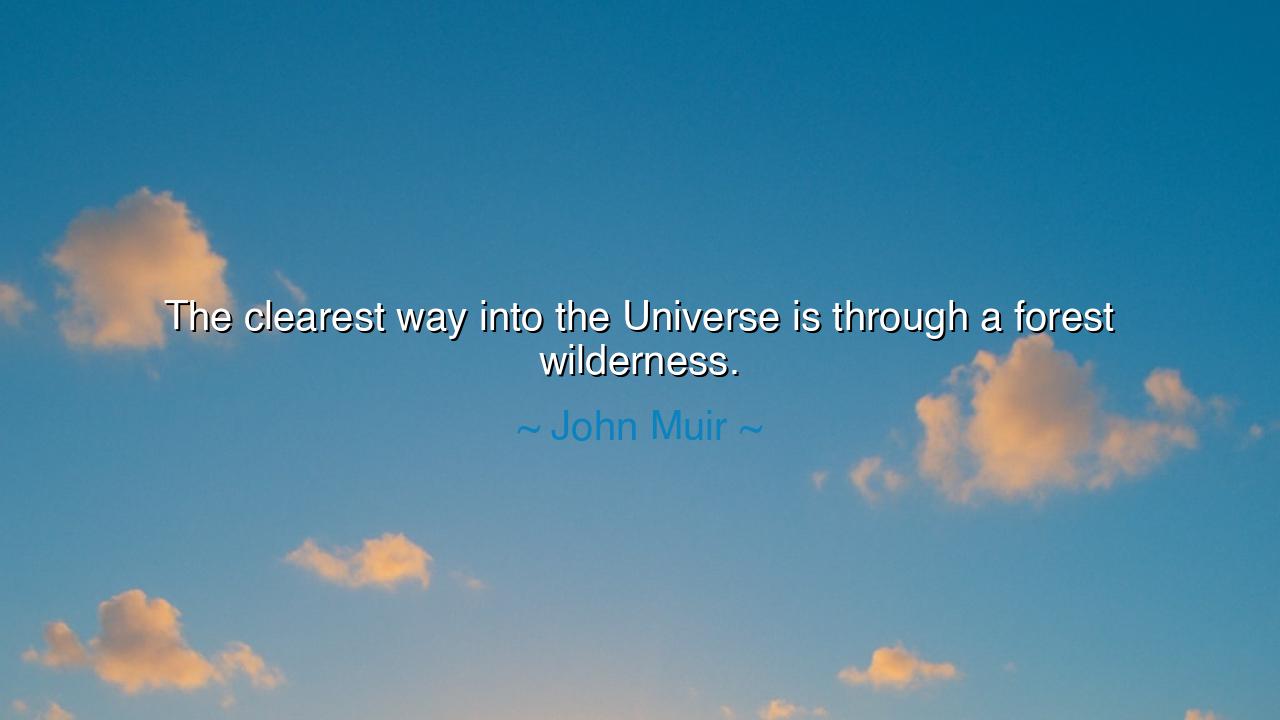
The clearest way into the Universe is through a forest






John Muir, prophet of the mountains and defender of the wild, once proclaimed: “The clearest way into the Universe is through a forest wilderness.” These words rise like a hymn from the depths of his soul, carrying both reverence and command. He reminds us that the door to the infinite is not opened by libraries of speculation nor by the towers of man, but by the hush of the forest, where every tree is a column of eternity, every stream a voice of the divine. In the silence of the wilderness, the soul finds clarity, and the veils between earth and the Universe are lifted.
The origin of this truth lies in Muir’s own life, for he was no mere philosopher of words, but a pilgrim who lived among the mountains, valleys, and forests of America. Born in Scotland, raised in Wisconsin, and wandering endlessly through the Sierra Nevada, Muir found in the forest wilderness not emptiness but fullness. To him, the cathedral of pines was greater than any built of stone, the sermon of rivers clearer than any priest’s homily. It was here that he felt the presence of the Universe itself, vast, intimate, and eternal, speaking directly to the heart.
The ancients, too, knew this path. The Druids worshiped in oak groves, believing trees to be sacred vessels of wisdom. Moses found revelation not in the courts of Pharaoh but on the mountain, before a burning bush in the wilderness. The Buddha reached enlightenment not in the noise of cities but beneath the Bodhi tree, with the forest as his silent witness. Again and again, the eternal truth is revealed: to find the Universe, one must leave the clamor of men and walk the quiet paths of nature.
History offers countless testimonies of souls who discovered clarity in the wild. Consider Henry David Thoreau at Walden Pond, who withdrew from society to live “deliberately,” and in the solitude of woods found lessons for all humanity. Or think of Albert Einstein, who often spoke of walking in the woods as a source of his deepest insights into the Universe. These lives show what Muir declared openly: that the wilderness does not cloud the mind but purifies it, stripping away illusions until only truth remains.
The meaning of Muir’s words is both poetic and practical. He teaches us that the Universe is not distant, far away in unreachable galaxies, but close—woven into the branches above our heads, reflected in the pools of the forest floor, carried in the cry of a bird. To enter the Universe is not to escape the world, but to see it as it truly is: alive, ordered, vast, and sacred. The forest wilderness is a mirror in which we glimpse both creation and ourselves, stripped of pretense, humbled and exalted at once.
The lesson for us is clear: if you wish to find truth, if you seek clarity, if you yearn for the eternal, go into the forest wilderness. Leave behind, for a time, the machinery of the world, the dust of streets, the endless noise of human striving. Walk beneath the trees, and let their age teach you patience. Sit by the rivers, and let their flowing teach you persistence. Look at the stars through branches, and know that you are part of the same Universe they illuminate.
Practically, this means making pilgrimage to wild places, not for conquest but for communion. Spend time in solitude beneath the open sky. Let the forest be your cathedral, the birds your choir, the wind your scripture. Carry what you learn there back into your daily life: simplicity, reverence, and the remembrance that man is not master, but guest, in the great household of creation.
Thus John Muir’s words endure, timeless and commanding: “The clearest way into the Universe is through a forest wilderness.” Let us heed them, for in the trees and streams lies not only beauty but revelation. To follow this path is to find peace, wisdom, and the eternal harmony of life itself. The wilderness is not empty—it is the threshold to the infinite.






AAdministratorAdministrator
Welcome, honored guests. Please leave a comment, we will respond soon